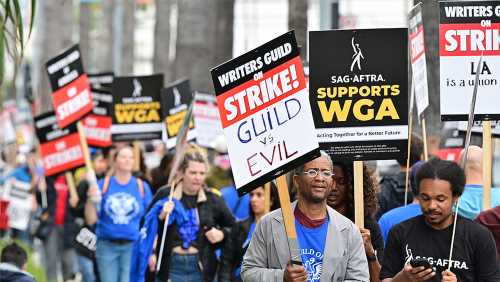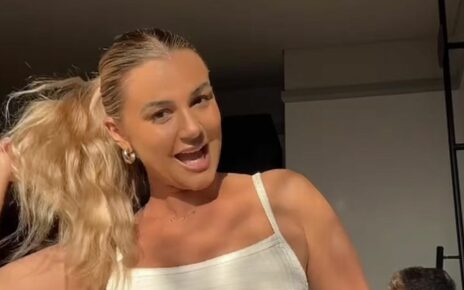Once the writers guild strike began, the ATX TV Festival had to change up many elements of their lineup. Specifically, they added a panel specifically about the strike, which began in May.
On Saturday, Beau Willimon, the president of the Writers Guild of America, East, moderated a conversation between WGA West’s Zoanne Clack and Julie Plec and WGA East’s Greg Iwinski, who is on the negotiating committee.
“We did not focus group, we did not go in and ask a management company what we should be asking for,” Iwinski, who has written on “Last Week Tonight With John Oliver” and “The Late Show With Stephen Colbert,” said at the top, explaining that they asked the 11,000 members what they were asking for and received 7,000 surveys back. “We brought these arguments to the studios and presented our solutions. And I had gone into the expectation that it would be a very difficult negotiation, and that we would be in a situation where we would be presented with a deal that was not great, but hard to say no to. And that is not what happened. We did six weeks of negotiations and at the end of it, we were still incredibly far apart.”
Clack, the head writer on ABC’s “Station 19,” stated that they’re pushing for more people in the writers room, as one writer shouldn’t be expected to write every episode. “If we don’t have enough people investing into our healthcare system and to our pension plan, that’s going to go away. We need to have people working to buy into that, so that we can keep that flush for our future,” she explained. “The other reason is to have people learn and see the fruits of their labor and to not just be gig workers — which is fine if that’s what you want to do. But I think most of us went into this for a career.”
Plec, best known for running “The Vampire Diaries” and created the upcoming Max series “The Girls on the Bus,” also spoke up about the healthcare issues, on top of the pay.
“We’re mad,” she said. “When I talk, I want to make it clear I’m talking on behalf or in the spirit of the people who struck in the past to get us the benefits that we have today, the people who are striking today to just hold on to their own livelihood and the people that we’re striking for which are those of the next generation… The lack of care for the artists and the content creators of this business has reached a breaking point — not just in the writers field, but in all labor guilds.”
She later noted a big difference between the 2007 strike and today’s: “There was the sense that the town was still run by people who cared about artists… There were people in that mix who really truly believed in the spirit of art and creating art and that there was money to be made for all in success. I think that’s all gone, and that’s not good for the people that are supporters of this union and the members of the union.”
Plec noted that one showrunner recently told her that writers have been getting “slowly dehumanized for so long” in the post-streaming age, that it’s “no wonder we’re looking at the threat of a robot being our biggest villain here.”
Iwinski touched on the rise of A.I. and the worries within the WGA. “The threat of us being replaced is not that they’re going to match our quality, is going to be that our bosses aren’t going to care,” he explained.
“I don’t really understand it, I don’t know where it’s going but it seems really important. And if we don’t get something codified in a language that a human being needs to do our jobs, we will never get that language and we will never have any protections,” Plec said. “I think that’s what other unions are starting to understand as well. So it is truly the clarion call, the mockingjay of this strike.”
As the panel wrapped, the group talked about fans of TV — most of the audience — were also being affected by the strike.
“The streaming era in many ways has screwed you guys,” Iwinski said. “It has cut the audience out of the feedback loop of television. Because in a world where there are no ratings and a show’s success or failure is based off what the numbers team can put out through a press release, in a world where you do not have the ability to permanently buy shows you love on physical media and keep them, in an era where shows are serialized to create cliffhangers but then pulled on Season 2 so you never get the satisfaction of knowing what happens in this world, you guys are being cut out, and it is not working.”
He continued, “We need to push for ratings in television… There are so many shows by people of color, there are so many shows by marginalized communities, that everyone I know in that community is watching and they cancel it [because] ‘No one was watching.’ Prove it. Show it to us.”
Read More About:
Source: Read Full Article

